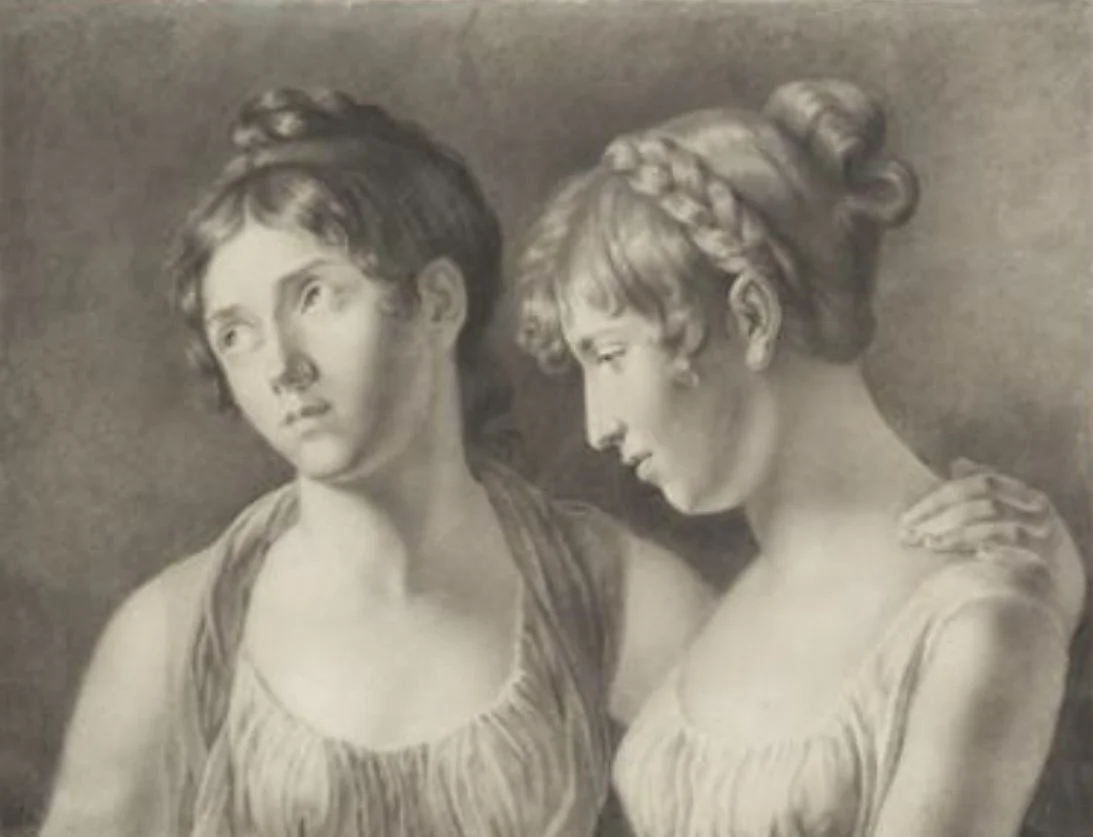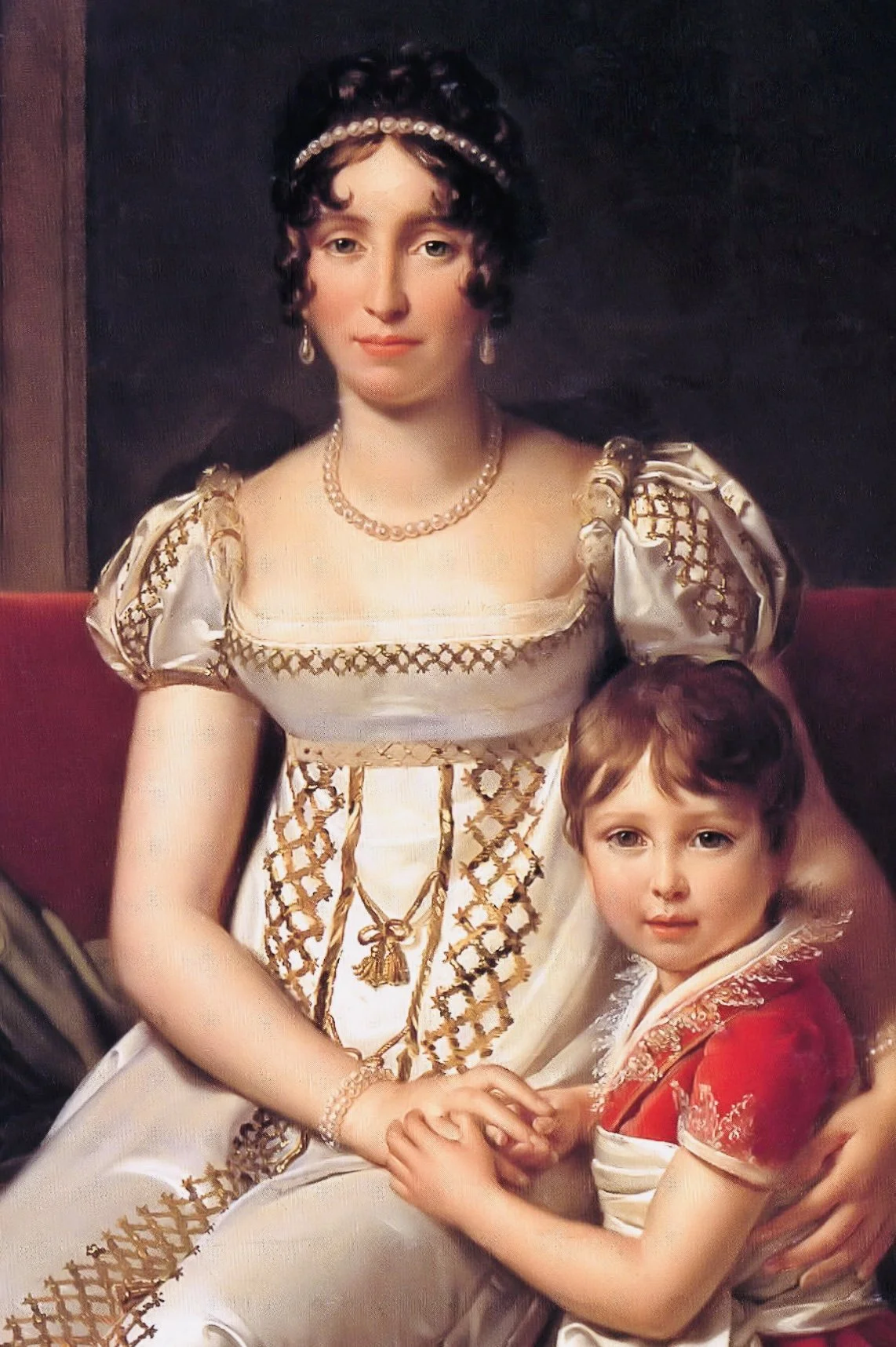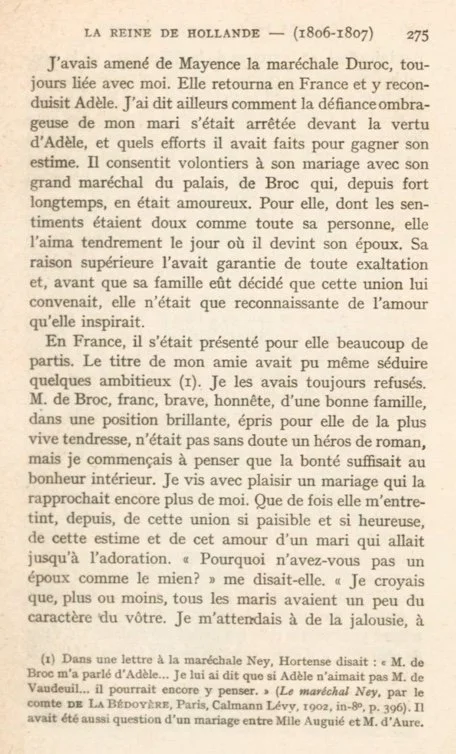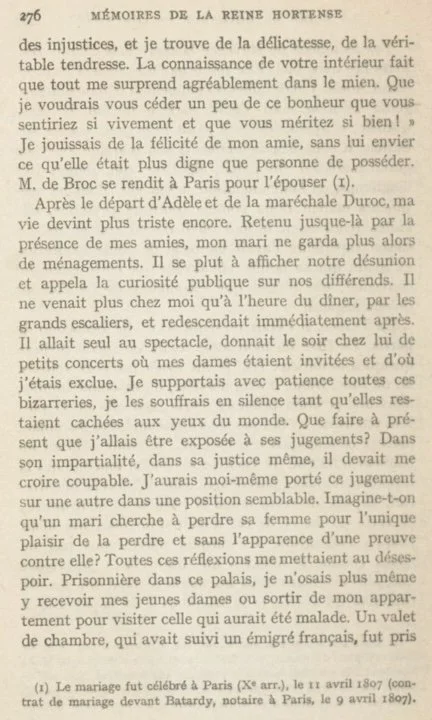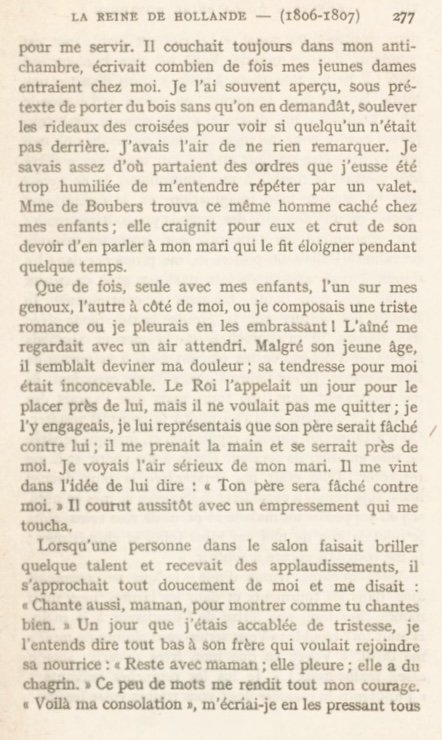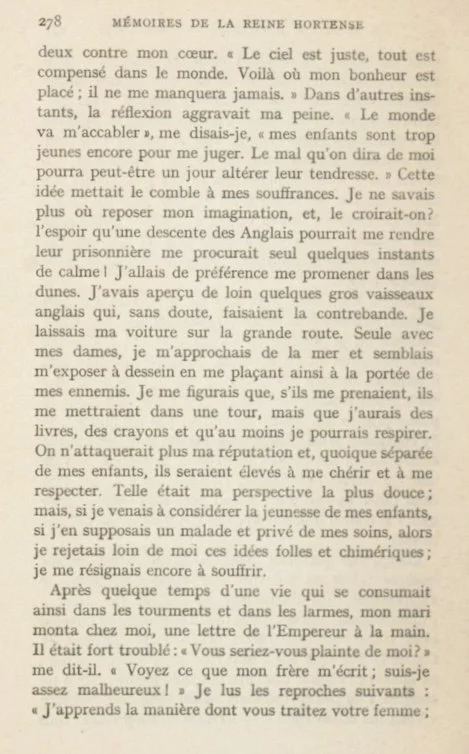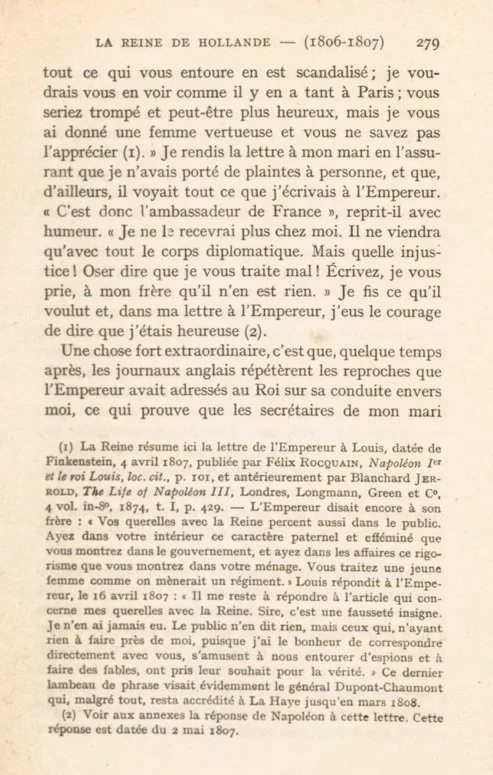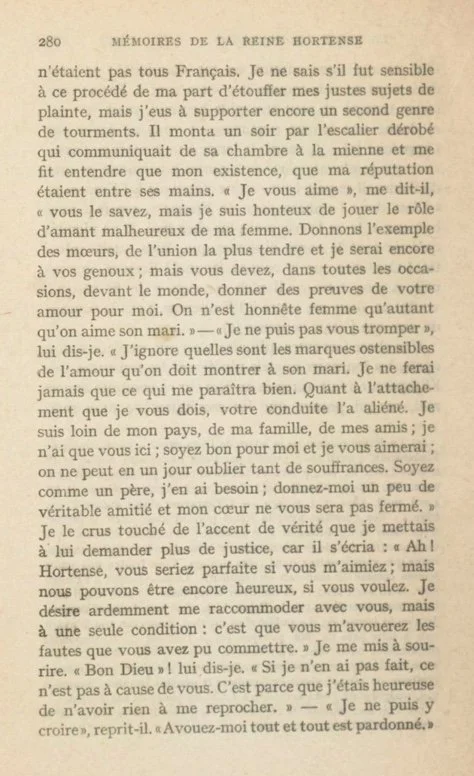Let’s have another look at Hortense’s Memoirs. If you want to read the book it is available for free at the side bar in English and French. Use the widget on the sidebar to translate the text below into pretty much any language.
I’m this excerpt, we see how Hortense’s life is twisted into one of torment where the idea of being captured sounds like a reprieve. Napoleon finds out about his brother’s insane behavior and complains to Louis about it.
Louis’ inclination is to try harder to cover it up.
Hortense’s memoirs continues:
He [Louis] willingly consented to her [Adele’s] marriage with Monsieur de Broc, Grand Marshal of the Palace, who had been in love with her for a long time. Adele loved her husband but only after she became his bride. She was too intelligent to allow herself to become unduly enthusiastic over the prospect of any marriage, and even after her family had decided that the match was a suitable one, she felt merely grateful for the affection which she knew she aroused.
In France she had had many opportunities to get married. The fact that she was known to be my friend was in itself enough to attract certain ambitious men. I had always refused to consider such suitors.
Monsieur de Broc, brave, kind, and upright in character, belonging to a good family, possessing a brilliant social position, and loving her tenderly, was nevertheless not a very romantic figure. He was no hero out of a story book, but I had come to believe that a really kind heart is enough to make one's married life happy.
The idea of a marriage which would keep Adele with me was attractive. How many times afterwards did she speak to me about their peaceful, harmonious union, about her husband's respect for her and his love which almost amounted to idolatry!
“Why could you not have had a husband like mine?" she would say. "I imagined all husbands were more or less like yours in character. I expected jealousy and unkind treatment, and instead I find thoughtfulness and sincere affection.
My knowledge of your home-life makes mine seem all the more agreeable. How I should like to give you some scrap of this happiness, which you would so appreciate and which you so well deserve!"
I was delighted that my friend should be happy but did not envy her that happiness of which she was more worthy than anyone I knew. Monsieur de Broc left for Paris to marry her. After Adele's departure and that of Madame Duroc my life grew still more dreary. Till then the presence of my friends had acted as a restraint on my husband. Now there was no reason for him to spare my feelings.
He took pleasure in making our discord known and attracted public attention to our domestic difficulties. He came to my part of the palace only at dinner time by the state stairways and went back to his own apartments immediately afterward. He went to the theater alone, gave informal evening concerts, to which my ladies in waiting were invited, but from which I was excluded.
I bore all these strange whims patiently. I endured them in silence as long as they did not become a topic for public gossip. What was I to do now that I had become the victim of his opinions? Even if he tried to be fair and impartial, he was obliged, on account of the way in which he had treated me, to believe that I had done wrong in order to justify himself in his own eyes. I should have done the same had I been called upon to judge a woman in the same predicament as that in which I found myself.
Was it possible to imagine that a husband deliberately sought to ruin his wife's reputation simply for the satisfaction of besmirching her and without even a shadow of evidence against her? All these thoughts drove me to despair. A prisoner in my palace, I no longer dared receive even the visits of my young ladies in waiting or leave my apartment to go and see one of them if she happened to be ill. A valet who had followed one of the royalist exiles abroad was engaged to wait on me.
He always slept in my anteroom and wrote down how many times my young ladies came in to see me. I often noticed that, when bringing in wood for the fire without anyone having ordered him to do so, he would push aside the curtains in front of the windows to see if there were not someone behind them. I pretended not to notice these actions. I knew too well whose orders and instructions he was obeying to wish to have them repeated to me by a servant.
Madame de Boubers once found this man hidden in my children's room. She was alarmed on their account and considered it her duty to mention the matter to my husband, who sent him away for a little while. How often have I, when alone with my children, one on my knees, the other playing beside me, composed some melancholy ballad or wept as I embraced them. The eldest looked at me as though he sympathized with my troubles. In spite of his youth he seemed to understand my grief. His affection for me was beyond words.
The King called him one day to sit beside him, but the little boy would not leave me. I asked him to do so, explaining that his father would be cross with him, but he took my hand and nestled closer to my side. I noticed that my husband looked annoyed. The idea occurred to me to say to the child, "Your father will be cross with me!" Immediately he ran to Louis with an eagerness which touched me. When some visitor in my drawing-room exhibited a talent as a singer and received applause my son would come over to me and say in a low voice: "Please sing too, mama, to show how well you sing."
Once when I was overcome with grief, I heard him say in a whisper to his brother, who wished to go to his nurse, "Stay with mother. She's crying. She feels badly."
These words renewed my courage. "Here I have my consolation," I exclaimed, pressing them both to my bosom. "God is just; everything on earth has its compensation. My happiness lies in my children. They can never fail me."
At other times such thoughts increased my sadness. "The world will condemn me," I said to myself. "My children are too young to be able to judge for themselves. Someday their affection for me will be tarnished by the evil reports that may be repeated in their presence." This idea increased my sorrow. I did not know what refuge my imagination could find.
Incredible as it may seem I even came to believe that only a surprise attack by the English troops in which I should be taken prisoner would give me a few moments' respite. My favorite walk was along the dunes. From there I could see some large English vessels which were doubtless engaged in the smuggling trade. I left my carriage waiting for me some distance off on the highway.
Accompanied only by my ladies in waiting, I approached the sea and seemed to expose myself intentionally, putting myself within the enemy's grasp. I fancied that if I were captured, they would shut me up in a tower but would let me have drawing materials. There at least I should breathe freely. There too my reputation would no longer be attacked, and although separated from my children they would be brought up to love and respect my memory.
Such were my fondest hopes, but if I stopped and thought of my children's extreme youth, if I imagined one of them ill and needing my care, then I would banish these mad and foolish ideas and resign myself to my sad fate. After this life of torment and tears had lasted some time my husband one day came upstairs to see me, a letter from the Emperor in his hand. He was much upset.
“You must have been complaining about me," he said. "This is what my brother writes. How unfortunate I am!" I read the following reproaches from the Emperor: "I have heard the manner in which you treat your wife. All those about you are scandalized at your conduct. I wish you were as so many men are in Paris. You would be deceived and perhaps be happier. Instead of that I gave you a virtuous wife, and you do not know how to appreciate her."
I returned the letter to my husband, assuring him that I had never complained to anyone and that as a matter of fact he read everything I wrote the Emperor.
“Then it must be the French Ambassador," he insisted angrily. "I shall refuse to receive him any more alone. He shall only be allowed to call with the rest of the diplomatic corps. How unfair people are! To dare to say that I treat you badly. Please write my brother that there is not a word of truth in these reports."
I did as he asked and in my letter to the Emperor, I found courage to say that I was happy. By some curious chance the English newspapers a short time later repeated the reproaches the Emperor had made my husband about the way in which he treated me. This would indicate that not all of my husband's secretaries were French.
The original French is available below:

